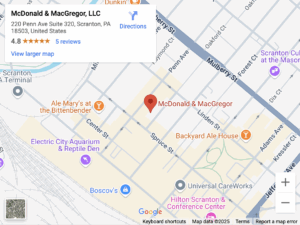McDonald & MacGregor, LLC | July 11, 2025 | Personal Injury Blog

If you’ve been injured on the job in Pennsylvania, workers’ compensation can be a lifeline. This no-fault system is designed to protect employees by covering key costs after a work-related injury or illness. You don’t have to prove your employer did anything wrong. You only need to show that your injury was work-related.
Here’s what Pennsylvania’s workers’ compensation insurance typically covers and how it can help you during recovery.
Medical Expenses for Work-Related Injuries
First and foremost, workers’ compensation pays for reasonable and necessary medical care related to your injury. This includes a wide range of treatment and services such as:
- Emergency room visits
- Hospital stays and surgeries
- Doctor’s appointments
- Prescriptions
- Physical therapy
- Medical tests like X-rays and MRIs
- Medical equipment or prosthetics
You may be required to visit a doctor from your employer’s list for the first 90 days of treatment. After that, you can usually see a provider of your choice. Keep in mind that you must follow your employer’s reporting procedures and notify them promptly about your injury to avoid delays or denials.
Wage Loss Benefits
If your injury causes you to miss work, you may be entitled to wage loss benefits. In Pennsylvania, workers’ comp generally covers about two-thirds of your average weekly wage, up to a certain limit. These benefits begin after seven days of disability. However, if your injury keeps you out of work for more than 14 days, you can get paid retroactively for that first week.
Generally speaking, these benefits help cover your lost income until you are able to return to work or reach maximum medical improvement.
Specific Loss Benefits
If you lose the use of a body part (such as a hand, foot, or vision in one eye), you may qualify for specific loss benefits. These payments are made even if you don’t miss time from work. Pennsylvania law provides a schedule for how long these payments last, depending on the type of loss.
You can also qualify for specific loss benefits if a serious disfigurement occurs to your head, face, or neck.
Death Benefits for Surviving Family
If a worker dies as a result of a job-related injury or illness, workers’ compensation can provide death benefits to surviving dependents. These may include weekly payments to the surviving spouse and minor children as well as overage for funeral and burial expenses, up to a specific limit.
Ultimately, the goal is to help families cope financially after a tragic loss.
What’s Not Covered
While workers’ comp covers a lot, it does have limits. For example, it usually doesn’t pay for non-economic damages like pain and suffering. It also won’t cover injuries that happen outside of work or because of intoxication, self-inflicted harm, or fighting.
In some cases, if a third party (like a contractor or equipment manufacturer) played a role in your injury, you may be able to file a separate personal injury claim to recover more. It’s important to learn about your legal rights and options after a workplace accident to ensure you recover all the compensation you’re entitled to under the law.
Contact a Workers’ Comp Attorney in Pennsylvania for a Free Consultation Today
Pennsylvania workers’ compensation is designed to protect you if you’re injured on the job. It pays for your medical bills, replaces lost income, and can even support your family in the event of a fatal injury. Understanding what’s included in your coverage is the first step toward protecting your rights.
If your claim has been denied or delayed, or if you just need help understanding your benefits, a workers’ compensation lawyer can guide you through the process. Get started with your claim today by reaching out to McDonald & MacGregor, LLC for a free case review.
Schedule a free case evaluation with our team today. We proudly serve Scranton, Wilkes-Barre, Hazleton, Luzerne County, Lackawanna County, and surrounding areas.
McDonald & MacGregor, LLC
220 Penn Ave Suite 320, Scranton, PA 18503
(570) 209-7062

